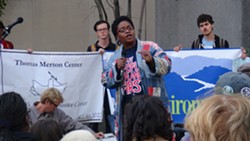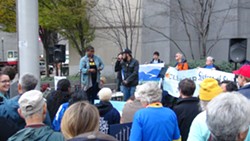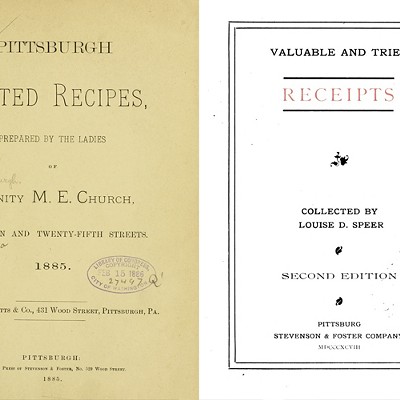Friday, November 13, 2015
Pittsburgh's African-American community leaders ask EPA for environmental justice during Clean Power Plan hearings
The Environmental Protection Agency is in Pittsburgh for two days to hear testimony on the federal Clean Power Plan, and minorities are asking that environmental-justice measures be included.

Photo by Ashley Murray
Carmen Alexander of New Voices Pittsburgh spoke at a rally outside of the federal building in Downtown Pittsburgh, where EPA hearings were taking place.
The hearings in Pittsburgh kick off a series of four EPA hearings, including sessions in Atlanta, Denver and Washington, D.C. The plan sets standards for greenhouse-gas emissions from fossil-fuel-fired power plants. The plan aims to reduce levels of carbon dioxide by 32 percent nationally under 2005 levels by 2030. States can implement their own plans — and Pennsylvania is on its way to doing so — but if a state does not comply, the EPA will enforce its own paln.
"What’s important here is states around us like West Virginia or Ohio, if they decide they don’t want to comply, we need a strong plan to get them to comply as well as other states across the nation," says Randy Francisco of the Sierra Club, which joined the coalition of groups rallying outside of the EPA hearing. "So this is big-time, as far as what it means to the country. We think we have an opportunity in PA to do better than whatever this might be, but that’s why we’re here."
Alexander and others asking the EPA for environmental justice say they want to make sure the agency knows that minorities and low-income communities are suffering disproportionately because of pollution.
"Structural discrimination ensures that they also have the hardest time bouncing back from these disasters," testified Ben Ishibashi, who traveled from Chicago with the group National People's Action.
"I'm a person of color. We're often shut out of these decisions," he told CP after his testimony. "But we're often the first to get hit by injustices. While I think the clean-power plan is a good start, it's not doing enough. I want to see a plan that's ten times as just."
According to the Centers for Disease Control and Prevention, African Americans were 20 percent more likely than non-Hispanic whites to have asthma in 2012. However, a direct cause is not listed.
"People who have lower incomes face greater risks of air pollution because we live closer to the sources of pollution," said Alexander during her testimony. "Less than 15

Photo by Ashley Murray
1Hood Media performed at a rally outside of the EPA Clean Power Plan hearings in Pittsburgh
"I can’t imagine how I was able to afford having three boys with asthma. I was making minimum wage, and at that time, we had to get medication for three boys. We had to navigate doctors' appointments to make sure they got the care they needed. We also had to make sure we had the co-payment available for them."
The American Lung Association's 2015 State of the Air report cites studies that link harmful air-pollution impacts to socioeconomically disadvantaged communities, and says that scientists speculate that one reason may be "housing dynamics and land cost" in proximity to pollution sources, among other possibilities.
"It’s important to include communities of color because they are some of the most effected communities particularly in Pittsburgh," Francisco said. "If you look at air quality in Pittsburgh, it’s affecting areas where these folks live, and that is having a harmful effect on their families, their livelihoods. So it’s so important to bring them into this conversation and to be part of their conversations on how we can lift every voice up in this movement."
According to the latest U.S. Census data available, the communities around the coal-fired power plant in Cheswick are a mixed bag of races and income levels. About three miles upriver, in New Kensington, the average household income is $47,000, and 10 percent of the population is African American. Approximately five miles down the river is Penn Hills, where households make on average $57,000, and 34 percent of the population is black. Meanwhile, across the river from the plant is Oakmont, where the average income is $82,000 and the black population is less than 1 percent.
"The thing to remember, of course, is that air pollution travels, and there’s certain pollution affecting local community, and there’s pollution affecting communities downwind, so it does affect more than immediate communities," Liz Perera, climate policy director for the Sierra Club, told CP by phone from Washington, D.C.
Just last month, the environmental group PennEnvironment named Cheswick the second largest polluter in Allegheny County.
Third on the report's list, and though not a coal-fired power plant, is another one of Pittsburgh's biggest polluters - U.S. Steel's Clairton Coke Works. The Clairton community is about 38 percent African American, and the per capita income for African Americans averages around $15,000. The monitor nearest that plant has put Allegheny County in non-attainment for fine particle pollution.
"We want them to know that we want strong regulations on the big power plants and that we want a clean environment," Alexander said. "Environmental justice is about just making sure that our communities are going to be green, that we’re taking care of our communities in a clean way. Pittsburgh is known for having our steel mills and our pollution."
Hearings last until 5 p.m. today, but according to the EPA's website, all speaking times have been assigned.
Tags: EPA , Pittsburgh , Clean Power Plan hearings , environmental justice , Image , Video















